The Great Silence Review by Len Liu
Review of The Great Silence (1968) aka Il grande silenzio / The Big Silence;
The Great Silence is Sergio Corbucci's magnum opus and is generally regarded as the best 'non-Sergio Leone' Spaghetti Western ever made. In fact, many armchair critics believe that this film is on par with Once Upon A Time In The West and the 'Dollars Trilogy'. Today, it is such a revered and celebrated film that it is difficult to imagine that it did rather modestly at the Italian box office upon its initial release. Notwithstanding, it did do better in France and Germany, the respective home countries of the film's two leading stars, Jean-Louis Trintignant and Klaus Kinski. For those in DVD region 1, this film is available on DVD under the Fantoma label, complete with special features and an alternate ending.

In late 1890's Utah during the Great Blizzard, a gunman named "Silence" is hired by a vengeful widower to kill the bounty hunters who killed her husband. Silence also helps out the starving outlaws (exiled Mormons perhaps?) who live up in the mountains and have to steal in order to survive. The new but competent Sheriff is unaccustomed to the territory's harsh winter, and quickly finds out that things work a little differently in the town of Snow Hill. The bounty hunters derive plenty of pleasure from their good paying jobs as "legalized killers". The outlaws just want amnesty and a decent meal. The most cordial and civilized citizens are the saloon girls. One especially ruthless bounty hunter in particular, Loco, is seemingly immune to any legal consequences due to his association with the town's corrupt magistrate.
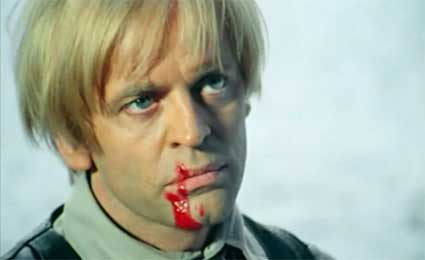
The plot flows nicely and lacks the sometimes overly episodic nature that is typical of the Spaghetti Western genre. Right away, you can feel that the always politically adamant Corbucci is trying to parlay a message to the audience, that is, the law givers and law upholders can often be more morally destitute than those who break the law breakers. Corbucci was always fond of making social statements and shaping political allegory in his movies, and The Great Silence is a leading example of that.
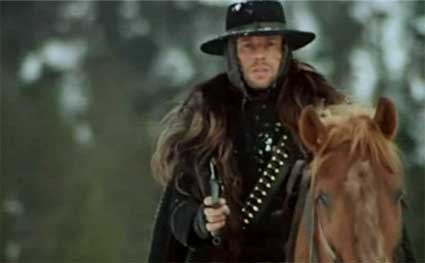
The film boasts an all-star international cast. In his lone western role, French art house icon Trintignant is terrific as Silence, the mute gunfighter with a tragic past and even more tragic future. Having no spoken lines in the film, Trintignant is forced to use facial expressions to "communicate", and performs admirably. German icon Klaus Kinski co-stars as Loco, the bounty hunting antagonist in what is probably his most notable leading role outside of his collaborations with Werner Herzog. American Frank Wolff, best known as Claudia Cardinale's ill-fated husband in Once Upon A Time In The West, is also good as the by-the-book Sheriff who seems to have taken an amusing liking to the middle-aged saloon hostess. Spaghetti Western regulars Luigi Pistilli and Mario Brega make an appearance, as well as blaxploitation diva Vonetta McGee, as the widow and eventual love interest of Silence. Trintignant, Kinski, McGee, and Wolff share excellent chemistry, and the interactions between the four characters are eloquent enough. The relationship between Kinski and Trintignant is initially one of detached rivalry, only to balloon into full-blown bloodshed. Trintignant and McGee both come together through shared pain and loneliness. Wolff and Kinski barely tolerate each other, and only their respective professionalism keeps them from displaying openly their mutual contempt, until Kinski's deviousness finally get the better of the relationship.
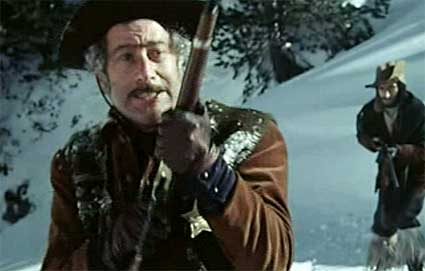
There are several reasons why this film is held in such high regard. One of them is ORIGINALITY. The Spaghetti Western genre is filled with films that are derivative to say the least, often virtual clones of other films. Originality is an attribute seldom seen in this genre. By contrast, The Great Silence is bursting at the seams with things that are so different from what you have seen in other westerns before or since: the snowy landscape rather than the smoldering heat of the southwest; the use of the Mauser Broomhandle as the weapon of choice rather than the familiar Colt Peacemaker; the shockingly negative ending in which the bad guys actually come out on top(!); the casting of an African American as the leading lady, the leading protagonist who is mute, and Silence's unique way of provoking adversaries into drawing first, and shooting off their thumbs. Perhaps the most interesting example of originality is the interesting reversal of roles, where the bounty hunters are the bad guys and the outlaws are the good guys. Corbucci takes the usual Spaghetti Western conventions and turns them on their head.
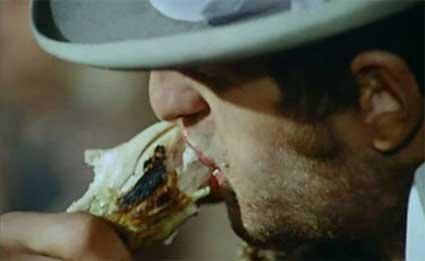
Ennio Morricone's haunting score is simply spellbinding, and only adds to the already dark, lonely, and desolate atmosphere of the film. The main theme is very reminiscent of Paul Mauriat's "Love is Blue". The scenery of the snowy landscape is impressive. You also have to admire the resourcefulness of the filmmakers. Apparently, in the scenes that were shot in locations where there was no snow, they used lots of shaving cream, and shot the scenes at night to conceal the absence of real snow. The well done action scenes omit the ridiculousness that you often see in typical films of the genre (except for the alternative ending of course). Does the film have any weaknesses? Well, for those viewers such as I who prefer more upbeat and lighthearted Spaghettis Westerns, you might find this one to be a bit on the depressing side. It's not exactly the best choice of movie to watch if you happen to be having a bad day, and the ending is bound to worsen your mood even more. The dialogue is comic-bookish at times. McGee's famous line: "Because wherever he goes, the silence of death follows." Do people actually talk like that in real life?
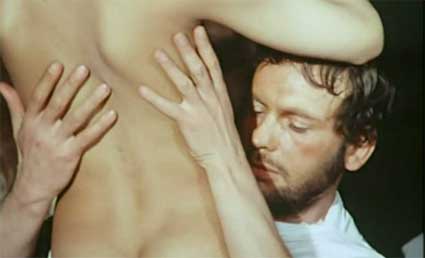
Even with such classic films like Django and Companeros under his belt, The Great Silence, more so than any of his other films, was responsible for Sergio Corbucci's lofty status as the second most illustrious Spaghetti Western director of all time. The reader may find it surprising that the author of this review actually not that big of a fan of this film. I prefer "happier" movies. Nevertheless, I do acknowledge that this film is indeed a masterpiece. Great performances and casting, nicely executed action sequences, a dark, haunting, eerie atmosphere, and refreshing originality all combine to make this film mandatory viewing for anyone and everyone who dares to call himself a Spaghetti Western fan.
for J.D.'s review of this film, click here.
--by Len Liu
This article is part of the A Fistful of Pasta archive



